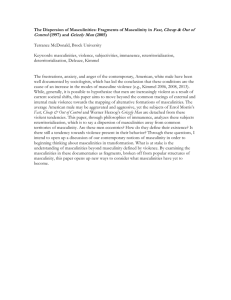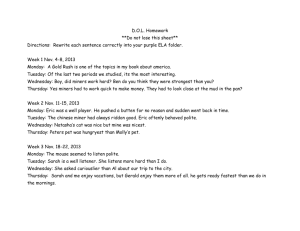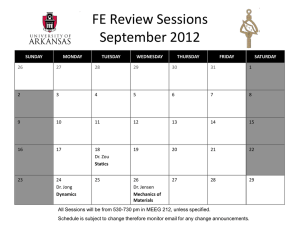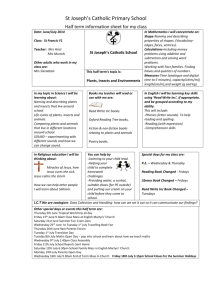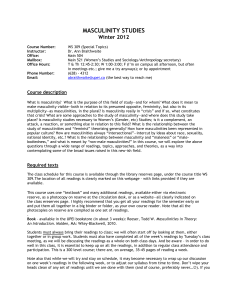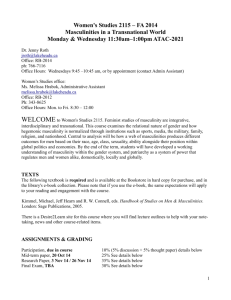Men and Masculinities: Identities and Intersections of Manhood SOC
advertisement
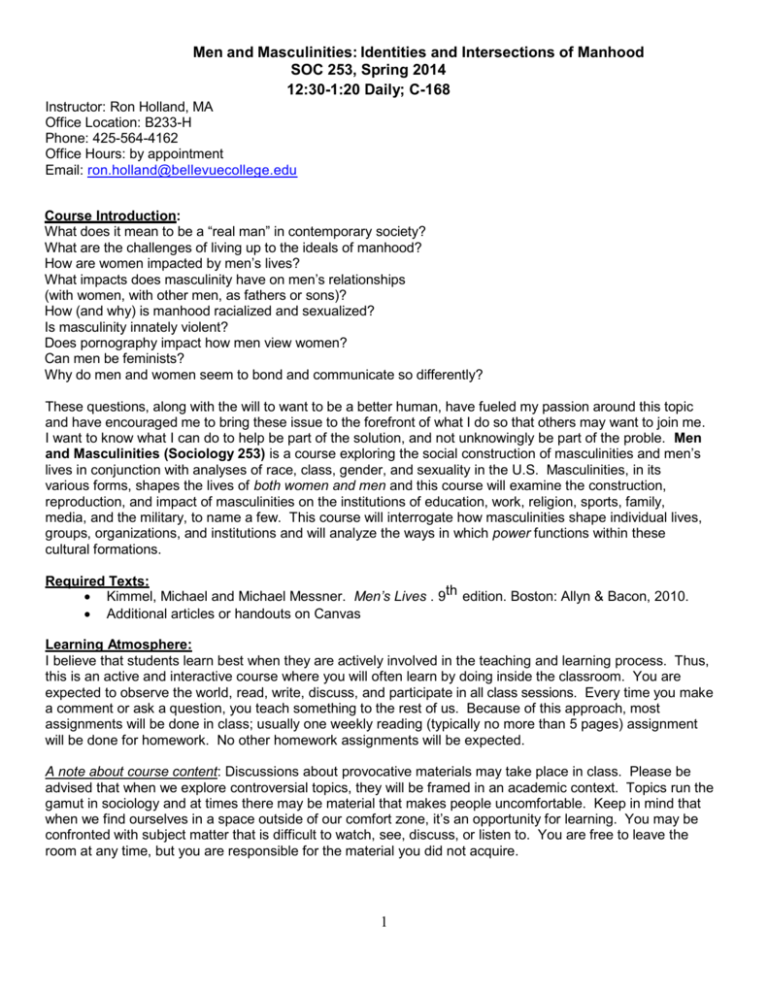
Men and Masculinities: Identities and Intersections of Manhood SOC 253, Spring 2014 12:30-1:20 Daily; C-168 Instructor: Ron Holland, MA Office Location: B233-H Phone: 425-564-4162 Office Hours: by appointment Email: ron.holland@bellevuecollege.edu Course Introduction: What does it mean to be a “real man” in contemporary society? What are the challenges of living up to the ideals of manhood? How are women impacted by men’s lives? What impacts does masculinity have on men’s relationships (with women, with other men, as fathers or sons)? How (and why) is manhood racialized and sexualized? Is masculinity innately violent? Does pornography impact how men view women? Can men be feminists? Why do men and women seem to bond and communicate so differently? These questions, along with the will to want to be a better human, have fueled my passion around this topic and have encouraged me to bring these issue to the forefront of what I do so that others may want to join me. I want to know what I can do to help be part of the solution, and not unknowingly be part of the proble. Men and Masculinities (Sociology 253) is a course exploring the social construction of masculinities and men’s lives in conjunction with analyses of race, class, gender, and sexuality in the U.S. Masculinities, in its various forms, shapes the lives of both women and men and this course will examine the construction, reproduction, and impact of masculinities on the institutions of education, work, religion, sports, family, media, and the military, to name a few. This course will interrogate how masculinities shape individual lives, groups, organizations, and institutions and will analyze the ways in which power functions within these cultural formations. Required Texts: Kimmel, Michael and Michael Messner. Men’s Lives . 9th edition. Boston: Allyn & Bacon, 2010. Additional articles or handouts on Canvas Learning Atmosphere: I believe that students learn best when they are actively involved in the teaching and learning process. Thus, this is an active and interactive course where you will often learn by doing inside the classroom. You are expected to observe the world, read, write, discuss, and participate in all class sessions. Every time you make a comment or ask a question, you teach something to the rest of us. Because of this approach, most assignments will be done in class; usually one weekly reading (typically no more than 5 pages) assignment will be done for homework. No other homework assignments will be expected. A note about course content: Discussions about provocative materials may take place in class. Please be advised that when we explore controversial topics, they will be framed in an academic context. Topics run the gamut in sociology and at times there may be material that makes people uncomfortable. Keep in mind that when we find ourselves in a space outside of our comfort zone, it’s an opportunity for learning. You may be confronted with subject matter that is difficult to watch, see, discuss, or listen to. You are free to leave the room at any time, but you are responsible for the material you did not acquire. 1 Learning and Course Outcomes: After participating, discussing, and completing this course, a successful student will demonstrate: 1. Explain the difference between "sex" and "gender" 2. Demonstrate how masculinity is socially constructed 3. Analyze the ways in which masculinity influences how boys become men 4. Understand how masculinity has changed historically 5. Critically assess the ways masculinity impacts men’s lives including sex, work, friendship, sports, and/or fatherhood 6. Discuss the impacts of race, class, and sexuality on masculine identities General Education Outcomes: This course’s General Education ratings are: 2 in Critical Thinking, 2 in Reading, 1 in Writing, 1 in Listening and Speaking, 2 in Historical and Intellectual Perspectives, and 3 in Cultural Diversity. Some basic premises to this course: We will be focusing a lot of this course around the idea of hegemonic masculinity. Hegemonic masculinity is the term used to explain the criteria for being the ideal man in a particular culture. The term serves as a model for all men and to show how they “should” be. Ultimately, hegemonic masculinity subordinates any alternative masculinities as well as femininities. As Michael Kimmel, author of our text, notes: “In an important sense there is only one complete unblushing male in America: a young, married, white, urban, northern, heterosexual, Protestant, father, of college education, fully employed, of good complexion, weight, and height, and a recent record in sports… Any male who fails to qualify in any one of these ways is likely to view himself–during moments at least– as unworthy, incomplete and inferior” (Kimmel & Aronson 2008:4). We will be challenging, critiquing, and discussing the damaging effects of hegemonic masculinity and how it is harmful to BOTH men and women. General Course Rules and Expectations: 1. Attendance: Attend all class meetings and come to class on time. Your presence in class is required to do the assignments and activities. If you have an excused tardy, you will be asked to go onto CANVAS, complete what was missed, and turn it in within three days of your return to class. To have an absence or tardy considered excused, you must discuss it with me prior to the absence or tardy, unless it is an emergency. Excused absences include doctor’s visits, family emergencies, and sometimes work- related issues. If you miss class, please connect with your colleagues/CANVAS to find out what you missed. 2. I highly recommend that you get the names and contact information of one or two of your classmates so you can contact them for any assignments or notes you may have missed while absent. 3. Preparation: You should come to class having done the assigned weekly reading and you should always bring the proper supplies, including notes and assigned readings with you daily. 4. Late Work: I believe that one of the major lessons students take away from college is the importance of meeting deadlines. As a result, no late work will be accepted unless you have had it approved by me BEFORE the due date. Late work will receive a zero grade. 5. Contribution: Learning about each other’s experiences and perspectives is an integral part of the learning process in this course. I believe that you will learn a lot about yourself and your classmates. Therefore, you are expected to be an active participant in our learning environment. 6. An active participant can include contributing to discussions, but can also mean getting to class on time, taking notes, listening to your peers, and coming to class prepared. You should do your best to contribute to class discussions and activities. 7. Classroom Etiquette: All electronic devices are prohibited in the classroom at all times. This includes cell phones, blackberries, laptops, i-pods/mp3 players, etc. If you need a laptop to take notes, I will need verification. All texting devices should be placed in your bag for the duration of the class. Please note that that texting, excessive talking, or other disruptive behavior is not only disrespectful to me, it is also disrespectful to the people around you. Your participation grade will be affected and lowered by 2 these types of behaviors. 8. Respect: I expect that your behavior in class be respectful. Learning about diverse experiences is central to this course, so it is of the utmost importance that you respect your classmates’ experiences, differences, and opinions. In order for us to learn from each other, we have to allow each other to make mistakes and to offer unpopular positions for debate. This is a college classroom and as such, I expect students to behave as adults. I do not tolerate excessive talking or whispering, consistent late arrivals, or early departures. Students who are disrespectful to their classmates or the instructor will be asked to leave class and will be marked absent until arrangements are made with the instructor to return to class and will result in your participation credit lowering. 9. Plagiarism: Cheating, stealing and plagiarizing (using the ideas or words of another as one’s own without crediting the source) are violations of the Student Code of Conduct at Bellevue College. This is a serious offense so do not do it! If you cheat/plagiarize, you fail. Bellevue College’s Rules and Regulations: 1. Incomplete: If a student fails to complete all the required work for a course, an instructor may assign the grade of Incomplete (“I”). The student must complete the coursework by the end of the next quarter, or receive the assigned letter grade (usually an “F”). 2. F Grade: Students who fail a course will receive a letter grade of "F.” 3. Final Examination Schedule: The Social Science Division will adhere to the final examination schedule as stated in the BC Schedule. Final examinations will be held at the end of each quarter at fixed times. Instructors will not give examinations in advance of the regular schedule. A student who is absent from any examination held at any time during the quarter may forfeit the right to make up the examination. If, for illness or some other circumstance beyond the student's control, the student is unable to be present at any scheduled examination and has contacted the instructor on a timely basis, the student may be permitted to take such examination at a time designated by the instructor. 4. Withdrawal from Class: College policy states that students must formally withdraw from a class by the end of the seventh week of the quarter (Registration Office, B125). If a student has not withdrawn by that date, an appropriate letter grade will be assigned for the course. 5. Hardship Withdrawal: Instructors may assign the grade of “HW” (hardship withdrawal) at their discretion in the event that a student cannot complete the coursework due to extreme and exceptional circumstances. Students may also contact the Enrollment Services office BEFORE grades are assigned in cases of hardship. 6. Cheating, Stealing and Plagiarizing: Cheating, stealing and plagiarizing (using the ideas or words of another as one’s own without crediting the source) and inappropriate/disruptive classroom behavior are violations of the Student Code of Conduct at Bellevue College. If you are accused of cheating, stealing exams and/or plagiarism, there is a Bellevue College Student Discipline and Appeals Procedure (the right to due process) which you may pursue. Contact the office of Division Chair (D110), the Dean of Student Services (B231A) or the Associated Student Body (C212) for information regarding the appeals process. Students with Disabilities: The Disability Resource Center serves students with a wide array of learning challenges and disabilities. If you are a student who has a disability or learning challenge for which you have documentation or have seen someone for treatment and if you feel you may need accommodations in order to be successful in college, please contact us as soon as possible. If you are a person who requires assistance in case of an emergency situation, such as a fire, earthquake, etc, please meet with your individual instructors to develop a safety plan within the first week of the quarter. The DRC office is temporarily located in the Library Media Center or you can call our reception desk at 425.564.2498. Deaf students can reach us by video phone at 425-440-2025 or by TTY at 425-564-4110. Please visit our website for application information into our program and other helpful links at www.bellevuecollege.edu/drc 3 Grading: Grades are based on four factors. (1) Discussions, (2) Weekly Response Papers, (3) Exams, (4) In-Class activities. Each of these elements is awarded a specific number of points: Discussions Weekly Seminar Papers (10 at 10 points/each) Exams (2 at 100 points/each) In-Class Activities (10 at 10 points/each) TOTAL 100 100 200 100 points points points points 500 points 4 Description of the 4 Grading Components: 1. Discussion (100 points – 10 points each): Participation is essential to the format of this class and will therefore contribute significantly toward your grade. In short, your success in this class depends on your active participation. Participation includes class discussions and group work. To have an absence or tardy considered excused, you must discuss it with me prior to the absence or tardy, unless it is an emergency. Disruptive behavior, excessive talking, texting while in class, or other interruptions will lower this portion of your grade. See the General Course Rules and Expectations for details about what is considered disruptive behavior. 2. Weekly Seminar Papers (100 points – 10 points each): Each week, I will provide students with a prompt that connects specific reading(s) and/or film clip(s) to larger issues, current events, or even your own life. The purpose of these seminar papers are to ensure that you are keeping up with the readings and allows students to make connections and apply key concepts beyond the assigned readings. For example, I might ask students to use particular assigned articles or discussions and apply ideas presented in those readings to the recent murder of Treyvon Martin, the “hoodie debate,” and conceptions of Black masculinity. Seminar papers are not just your own opinion; they are informed by the readings and should be one types page (these will be typed in CANVAS). 3. Exams (200 points – 100 points each): Over the course of the quarter, you will take two exams that integrate the course’s in-class activities, lectures, films, and readings. Exams are designed to make sure you understand important course concepts and themes. Exams will be multiple choice. 4. In-Class Activities (100 points – 10 points each): Over the course of the quarter, you will be asked a total of 10 times to submit work that you have completed during the class session. These in-class activities can occur either individually or in a group. For example, I might bring in magazines for gender analysis one day and ask students to look at how masculinity is depicted or I might provide you with specific questions related to a film we will be watching in class and have you submit those at the end of class. 5 ** General Guidelines for All Written Work ** All papers or written work will be done in class, but remember, you must always give proper credit to the texts from which you draw and formulate your ideas. Student information (name, assignment title, class) is singlespaced, at the top left-hand side of the page. Do not put extra spaces between paragraphs and paragraphs contain no less than four sentences. Movie titles, article titles, song titles, etc. are “in quotation marks.” Quotes inside of a quotation use ‘single quotation marks.’ Papers should be written from an academic perspective – so no colloquial language please! Additionally, do not worry about spelling! Instructor Notes: If at any point throughout the quarter you are confused or unclear about the expectations of the course, course material, a grade you received, or any other matters, I strongly encourage you to come talk with me early. It is my goal that all students succeed in this course; but, I can only help you if you meet me half way. Furthermore, if you are having personal problems or other issues going on outside of school, please let me know. I recognize that we all have lives outside of school, and am very willing to work with students, but I can only do so if I know there is a problem. Syllabus You should be looking at your syllabus on a daily basis so you know what is expected of you in class. You are to have read the readings assigned for the current day by the time you arrive in class! **Though I will try to remain as faithful as possible to this syllabus, I reserve the right to make changes. These will be announced in advance in class. ** Week 1 Monday, April 6th: Introduction to the Course: Getting to Know Peers Go over syllabus; class introductions, Lecture Tuesday, April 7th: Course Overview Lecture: MLA Presentation; continued lecture Wednesday, April 8th: Introduction Activities: 1. Box Exercise & Wizard of Oz Thursday, April 9th: Introduction Seminar Paper #1 Due Friday, April 10th: Introduction Readings: The Act-Like-A-Man-Box pp.14-16 Discussion Questions 1-4 ________________________________________________________________________________________________________________ Week 2 Monday, April 13th: Hidden: A Gender Lecture: Summary of course; Key Points Tuesday, April 14th: Hidden: A Gender Discussion Questions 1-8 Wednesday, April 15th: Hidden: A Gender Activities: 1. Newspaper/Magazine op/ed Thursday, April 16th: Hidden: A Gender Seminar Paper #2 Due Friday, April 17th: Hidden: A Gender Readings: Warrior Narratives In The Kindergarten Classroom: Renegotiating The Social Contract pp. 43-53 Week 3 Monday, April 20th: Upping the Ante Lecture: Summary of course; Key Points Tuesday, April 21st: Upping the Ante Discussion Questions 1-6 Wednesday, April 22nd: Upping the Ante Activities: 1. Men Magazine 2. Women Magazine Thursday, April 23th: Upping the Ante Seminar Paper #3 Due Friday, April 24th: Upping the Ant Readings: Making A Name For Yourself: Transgressive Acts And Gender Performance pp. 80-91 ________________________________________________________________________________________________________________ Week 4 Monday, April 28th: Backlash Lecture: Summary of course; Key Points Tuesday, April 29th: Backlash Discussion Questions 1-4 Wednesday, April 30th: Backlash Activities: 1. Newspaper/Magazine op/ed Thursday, May 1st: Backlash Seminar Paper #4 Due Friday, May 2nd: Backlash Readings: A War Against Boys? pp. 93-98 ________________________________________________________________________________________________________________ Week 5 Monday, May 5th: The Tough Guise Lecture: Summary of course; Key Points Tuesday, May 6th: The Tough Guise Discussion Questions 1-9 Wednesday, May 7th: The Tough Guise Activities: African-American Male Stereotype Readings: Ron Weitzer and Charis Kubrin: “Misogyny in Rap Music” pp. 490-496 Thursday, May 8th: The Tough Guise Seminar Paper #5 Due Friday, May 9th: The Tough Guise Test One (Weeks 1-4) Week 6 Monday, May 12th The School Shootings Lecture: Summary of course; Key Points Tuesday, May 13th: The School Shootings Discussion Questions 1-9 Wednesday, May 14th: The School Shootings Activities: 1. Reduce School Violence Thursday, May 15th: The School Shootings Seminar Paper #6 Due Friday, May 16th: The School Shootings Readings: The Seven P's of Men's Violence pp. 542-546 Week 7 Monday, May 19th: Constructing Violent Masculinity Lecture: Summary of course; Key Points Tuesday, May 20th: Constructing Violent Masculinity Discussion Questions 1-7 Wednesday, May 21st: Constructing Violent Masculinity Activities: 1. Kids and Violence Thursday, May 22nd: Constructing Violent Masculinity Seminar Paper #7 Due Friday, May 23rd: Constructing Violent Masculinity Readings: More Than a Few Good Men pp. 622-633 ________________________________________________________________________________________________________________ Week 8 Tuesday, May 27th: Sexualized Violence Lecture: Summary of course; Key Points Wednesday, May 28th: Sexualized Violence Discussion Questions 1-3 Activities: List of Power Thursday, May 29th: Sexualized Violence Seminar Paper #8 Due Friday, May 30th: Sexualized Violence “A slip of the Tongue” Week 9 Monday, June 2nd: Vulnerability Lecture: Summary of course; Key Points Tuesday, June 3rd: Vulnerability Discussion Questions 1-6 Wednesday, June 4th: Vulnerability Activities: Alternative Masculinities Thursday, June 5th: Vulnerability Seminar Paper #9 Due Friday, June 6th: Vulnerability Guest Speaker ________________________________________________________________________________________________________________ Week 10 Monday, June 9th: Better Men Lecture: Summary of course; Key Points Tuesday, June 10th: Better Men Discussion Questions 1-7 Wednesday, June 11th: Better Men Activities: Nelson Mandela Speech Reflection Thursday, June 12th: Better Men Final Review Friday, June 13th: Better Men Seminar Paper #10 Due ________________________________________________________________________________________________________________ Week 11 Final



